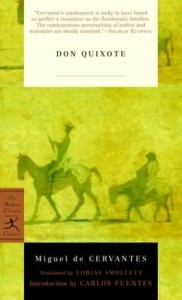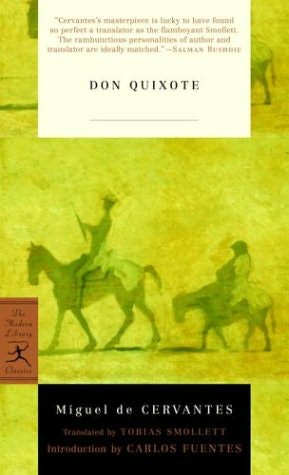By Paul Esau (Sports Editor) – Email
 It is rare to find a character in a book that so infiltrates the public mind that the name itself becomes an adjective. Only a few examples come to mind: Faust, Romeo, Satan (and I’m reaching with that last one). Yet in the pages of Don Quixote dwells a being so unabashedly strange that his name has become synonymous with delusional behaviour.
It is rare to find a character in a book that so infiltrates the public mind that the name itself becomes an adjective. Only a few examples come to mind: Faust, Romeo, Satan (and I’m reaching with that last one). Yet in the pages of Don Quixote dwells a being so unabashedly strange that his name has become synonymous with delusional behaviour.
To be “quixotic” is to be engrossed in chivalrous or idealistic fancies beyond the point of irrationality, perhaps even teetering on the edge of insanity. It is a definition which does the actual Don Quixote little justice, as author Miguel Cervantes portrays him as an outrageous lunatic in every sense of the word. “Don” Quixote of La Mancha is a minor Spanish gentleman whose obsession with books of chivalry leads him to terrorize the countryside as a self-proclaimed knight-errant searching for adventure. “In short,” Cervantes explains, “he so immersed himself in these romances that he spent whole days and nights over his books; and thus with little sleeping and much reading, his brains dried up to such a degree that he lost the use of his reason.”
Such is the beginning of a story that follows the ridiculous exploits of Don Quixote, a man whose imagination warps reality to fit his fancy. He sets off upon his fierce charger Rozinante (by all accounts a most pitiful nag), declares his undying allegiance to the “Empress of La Mancha” (a peasant girl named Dulcinea), and immediately mistakes two whores at an inn for noblewomen of an immense castle. The dichotomy between Don Quixote’s actual circumstances and what he perceives makes the tale desperately funny, a rare trait in a translated classic.
Of course the funniest moments in Don Quixote require at least a cursory knowledge of the courtly romances that are the root of Quixote’s insanity, and the object of Cervantes’ satire. Quixote is desperate to emulate the acts of heroes within his treasured books, and his interpretations of these ‘conventions’ of the genre are often hilarious. Early in the book, the would-be knight errant approaches a group of travellers upon the road and spontaneously issues the following challenge:
“Let all the world stand still if all the world does not confess that there is not in all the world a fairer damsel than the Empress of La Mancha, the peerless Dulcinea of El Toboso.”
Obviously, the idea of demanding that a complete stranger admit to the peerless beauty of a woman unknown to him is absurd, yet it has precedent in the romances of the Middle Ages. Cervantes’ point is that, just as a mortal man could not possibly survive the exploits of the fictional knights, so any man who (to put it conventionally) walks into a bar and challenges the occupants to either admit his girlfriend is the prettiest woman on earth or fight him, is asking for a mauling. Don Quixote is quickly deprived of his horse and weapons and summarily brutalized, a humiliation which sets the tone for a number of similar incidents throughout the book.
There is a lot of social commentary in Don Quixote as well, poking fun at Cervantes’ contemporary rivals, famous literature, and even the Spanish Inquisition, yet most of it requires more knowledge or more research than the average reader is willing to invest. What truly sets the book apart is that, even without a wealth of background information, Don Quixote is a joy to read. It’s funny, wacky, and, although a trifle long, provides a joyful romp along the liminal where reality and fantasy meet.


